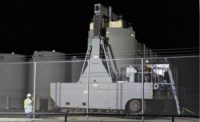Vermont had not yet decided by afternoon Jan. 20 whether to appeal a U.S. District Court ruling issued the previous day that Vermont cannot force Entergy to shut its Vermont Yankee nuclear plant in March.
"I am very disappointed in today’s ruling from the federal court,” said Vermont Gov. Peter Shumlin (D) on Jan. 19. “Entergy has not been a trustworthy partner with the state of Vermont. I continue to believe that it is in Vermont's best interest to retire the plant. I will await the attorney general’s review of the decision to comment further on whether the state will appeal." A phone call to the state attorney general’s office was not returned.
Judge Garvan Murtha of the U.S. District Court for the District of Vermont ruled that day that federal law pre-empts state law in matters of nuclear safety, and the state cannot stop Vermont Yankee from continuing to operate. Murtha, in his ruling, said that state’s concerns, over safety and radiation, are dictated by the Nuclear Regulatory Commission under the Atomic Energy Act.
Murtha, addressing claims by Vermont that Entergy has not been trustworthy, said, “Defendants have offered no evidence Entergy acted inequitably or in bad faith, and for the reasons discussed above, the court holds this argument is unpersuasive.”
The Nuclear Regulatory Commission relicense the 605-MW BWR unit until 2032. But in 2010, the Legislature, citing concerns over safety, refused to issue Entergy a state certificate to continue to operate, citing concerns over safety. Entergy took the issue to court to allow it continue to operate the 40-year old plant.
Following the ruling, Entergy issued a statement saying, “We’re pleased with the decision, which Judge Murtha issued after a thorough review of the facts and the law. The ruling is good news for our 600 employees, the environment and New England residents and industries that depend on clean, affordable, reliable power provided by Vermont Yankee.”
Murtha, in his ruling, also said that Vermont can not force Entergy to sell Vermont utilities at prices below maker purchased power, “because to do so is coercive and places substantial burdens on interstate commerce, in violation of the Commerce Clause.”



